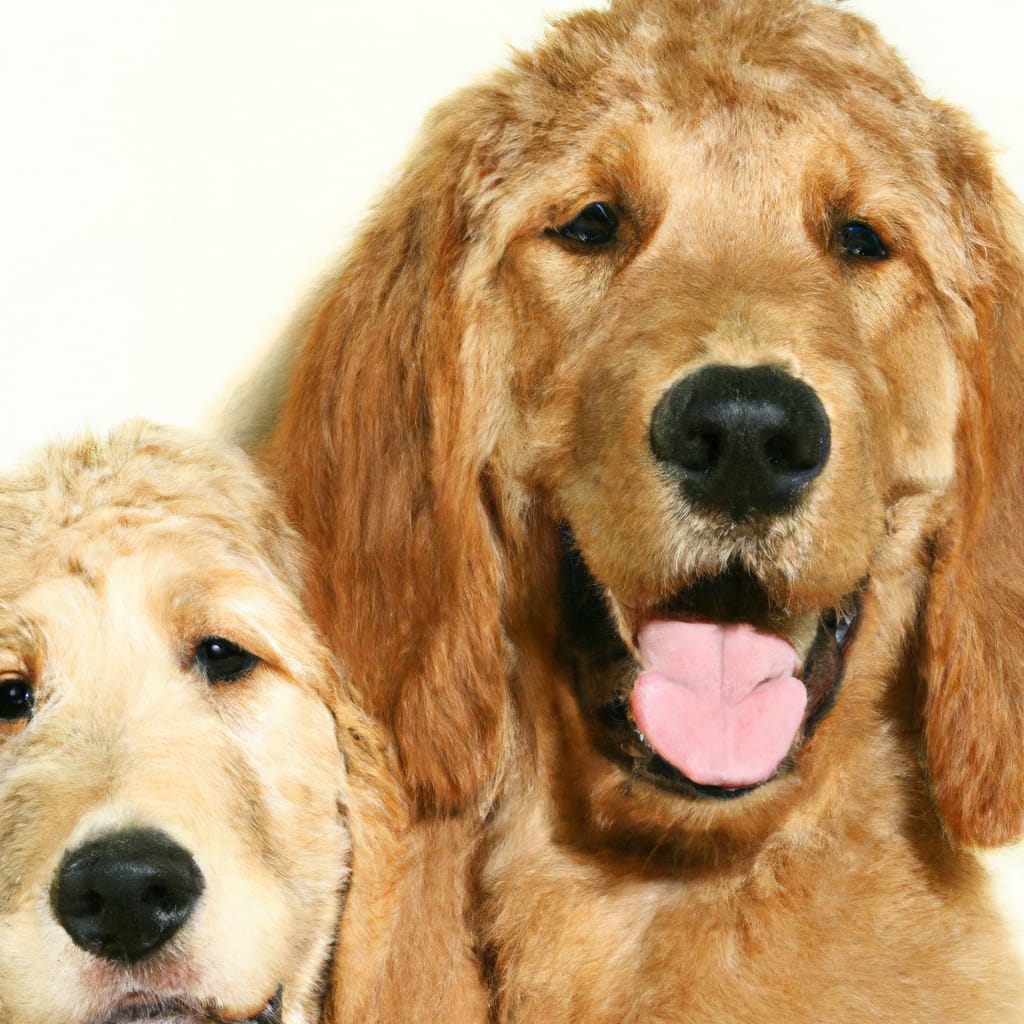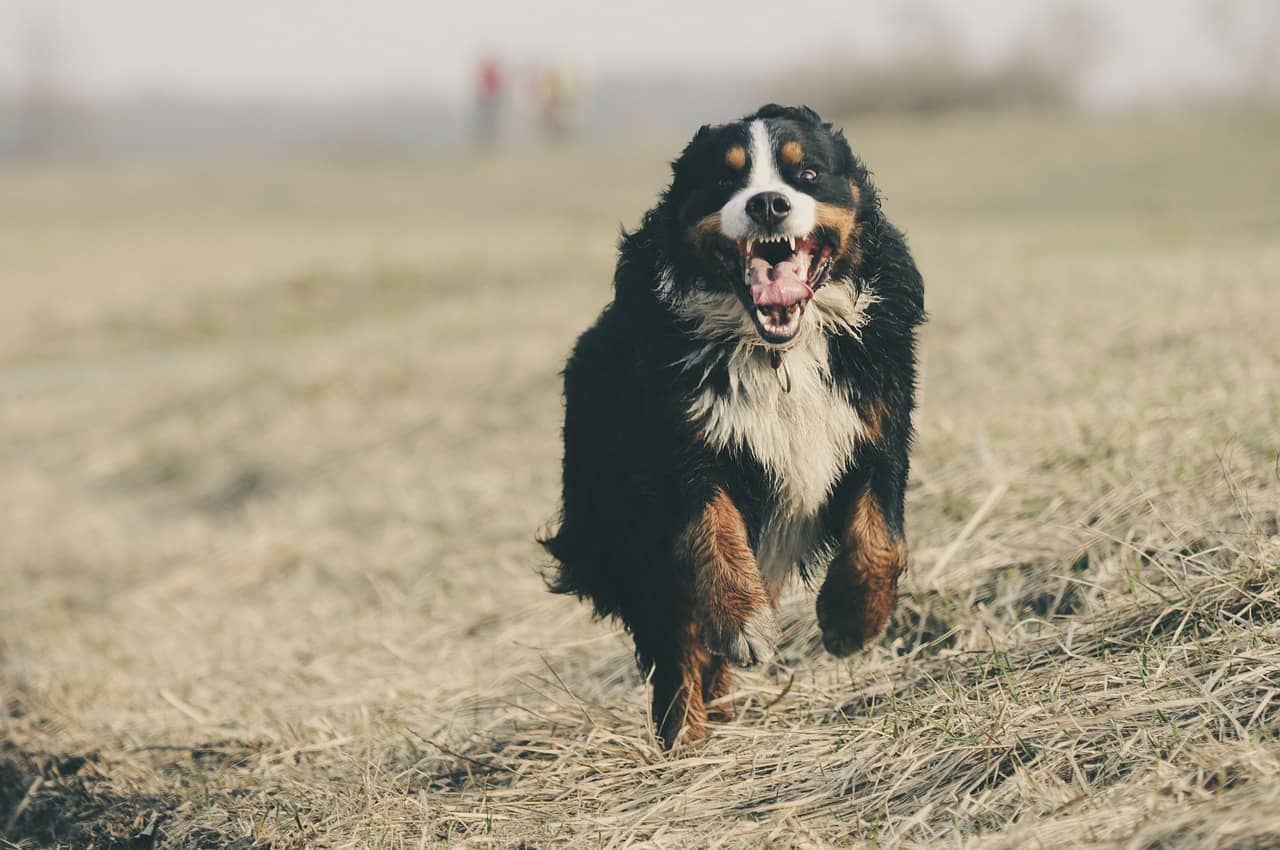Goldendoodle Vs Bernedoodle: Comparing These Doodles..
Are you torn between two adorable dog breeds, the Goldendoodle and the Bernedoodle? Both these “doodles” have captured the hearts of dog enthusiasts worldwide. While they may share some similarities, they also possess distinct traits that set them apart. In this article, we will be comparing the Goldendoodle and the Bernedoodle, helping you make an informed decision on which furry companion may be the perfect fit for you.

Appearance
Size
When it comes to size, both the Goldendoodle and Bernedoodle can vary depending on the size of their Poodle and Bernese Mountain Dog parents. Goldendoodles typically range in size from small to large, with miniature Goldendoodles weighing between 15 to 30 pounds and standing about 13 to 20 inches tall, while standard Goldendoodles can weigh between 50 to 90 pounds and stand around 20 to 24 inches tall at the shoulder.
On the other hand, Bernedoodles tend to be slightly larger, with miniature Bernedoodles weighing between 10 to 24 pounds and standing about 12 to 17 inches tall, and standard Bernedoodles weighing between 70 to 90 pounds and standing around 23 to 29 inches tall at the shoulder. Keep in mind that these are just general ranges and individual Goldendoodles and Bernedoodles may vary in size.
Coat Type
Both the Goldendoodle and Bernedoodle inherit their coat types from their Poodle and Bernese Mountain Dog parents. Goldendoodles are known for their wavy or curly coats, while Bernedoodles can have either wavy or straight coats. These hypoallergenic coats are low shedding, making them suitable for individuals with allergies. However, it’s important to note that not all Goldendoodles or Bernedoodles will have a hypoallergenic coat, as it can vary even within the same litter.
Coat Colors
When it comes to coat colors, both the Goldendoodle and Bernedoodle offer a wide range of options. Goldendoodles can come in various shades of cream, gold, red, or chocolate, and may also have patterns or markings such as parti, abstract, or tuxedo. Bernedoodles, on the other hand, typically have a tricolor pattern with black, white, and brown markings, but they can also have variations such as sable or merle. The coat color possibilities for both breeds are quite extensive, allowing you to find a Doodle with a shade that suits your preference.
Temperament
Energy Levels
Both the Goldendoodle and Bernedoodle are known for their friendly and outgoing personalities. They are generally active dogs that require regular exercise to keep them happy and healthy. However, Goldendoodles tend to have higher energy levels compared to Bernedoodles. This means that Goldendoodles may need more physical activity and mental stimulation to prevent them from becoming bored or restless. Bernedoodles, while still active, are often slightly more laid-back and may be more content to relax at home after a good walk or play session.
Trainability
Both the Goldendoodle and Bernedoodle are highly intelligent and eager to please, which makes them generally easy to train. They respond well to positive reinforcement techniques such as praise, treats, and consistent, patient training methods. Goldendoodles, being a mix of a Golden Retriever and Poodle, often inherit the Golden Retriever’s eagerness to please, making them highly trainable and adaptable. Bernedoodles, while equally intelligent, may have a slight independent streak inherited from the Bernese Mountain Dog, but with the right training approach, they can excel in obedience training and other commands.
Socialization
Socialization is an important aspect of raising a well-rounded and confident dog, and both Goldendoodles and Bernedoodles benefit from early and consistent socialization experiences. Exposing them to various people, animals, sounds, and environments at a young age helps them become more comfortable and confident in different situations. Both breeds are generally friendly and sociable, making them well-suited for families and individuals who enjoy an active lifestyle and want a dog that can easily adapt to different environments.
Health
Common Health Issues
Like all dog breeds, both Goldendoodles and Bernedoodles can be prone to certain health issues. Goldendoodles may be susceptible to conditions such as hip dysplasia, elbow dysplasia, progressive retinal atrophy (PRA), and certain heart conditions. Bernedoodles, being a crossbreed of Bernese Mountain Dogs, can also inherit some of the health issues commonly seen in that breed, including hip and elbow dysplasia, as well as certain genetic diseases like degenerative myelopathy and von Willebrand’s disease. Responsible breeders perform health screenings on their parent dogs to minimize the risk of passing on these conditions to their puppies.
Life Expectancy
Both the Goldendoodle and Bernedoodle have a similar life expectancy of around 10 to 15 years. However, it’s important to note that individual health, genetics, and overall care can greatly influence a dog’s lifespan. Providing a nutritious diet, regular exercise, routine veterinary care, and a loving environment can help ensure that your Goldendoodle or Bernedoodle leads a long and healthy life.
Maintenance
Both Goldendoodles and Bernedoodles require regular maintenance to keep them looking and feeling their best. This includes regular grooming, dental care, and providing a balanced diet. Grooming needs can vary depending on the coat type of your Doodle, but generally, they should be brushed several times a week to prevent matting and tangles. Regular dental care, such as brushing their teeth and providing dental chews, helps maintain good oral health. Additionally, feeding them a high-quality diet and providing regular exercise will contribute to their overall health and well-being.
Grooming
Brushing
Due to their wavy or curly coats, both Goldendoodles and Bernedoodles require regular brushing to prevent matting and keep their coats healthy. Brushing should be done several times a week using a slicker brush or comb to remove any tangles or loose hair. It’s important to start grooming and brushing your Doodle as early as possible to get them comfortable with the process. Regular brushing not only helps keep their coat looking tidy but also helps distribute natural oils, keeping their skin and coat in optimal condition.
Haircuts
The frequency of haircuts for Goldendoodles and Bernedoodles can vary depending on how fast their hair grows and the desired length of their coat. Most Doodle owners opt for professional grooming every 6 to 8 weeks to maintain a manageable coat length. The groomer can trim their hair to a length that suits your preference while keeping in mind the breed’s specific requirements. Some owners also choose to learn how to trim their Doodle’s coat at home, but it’s important to have proper grooming tools and knowledge to avoid any mishaps.
Shedding
Both Goldendoodles and Bernedoodles are considered low shedding breeds due to their Poodle ancestry. While they do shed less than some other dog breeds, they are not completely hypoallergenic. Doodles often have a hair-like coat that grows continuously, similar to human hair, which requires regular grooming to prevent matting. Shedding can vary from dog to dog, with some individuals shedding more than others. However, compared to breeds with a single coat, Goldendoodles and Bernedoodles typically shed less and are a better option for those with allergies or individuals who prefer a cleaner living environment.

Exercise Needs
Activity Level
Both the Goldendoodle and Bernedoodle are active breeds that require regular exercise to burn off energy and keep them physically and mentally stimulated. Goldendoodles, with their higher energy levels, may need more exercise compared to Bernedoodles. Daily walks, play sessions, and opportunities for off-leash activities in a secure environment are important for their overall well-being. Engaging them in activities they enjoy, such as retrieving a ball or participating in dog sports like agility or obedience, can also help keep them mentally sharp and content.
Outdoor Activities
Goldendoodles and Bernedoodles thrive in outdoor environments that provide them with ample space to run, explore, and engage in physical activities. Trips to the dog park, hiking trails, or dog-friendly beaches are great ways to provide them with varied outdoor experiences. It’s important to ensure that they are securely leashed or in a safely enclosed area to prevent any accidents or encounters with other animals. Always be mindful of weather conditions and adjust your outdoor activities accordingly to avoid overheating or discomfort for your furry friend.
Mental Stimulation
In addition to physical exercise, both Goldendoodles and Bernedoodles benefit greatly from mental stimulation to keep their minds sharp and prevent boredom. Puzzle toys, interactive games, obedience training, and even simple tasks like hiding treats for them to find can provide mental challenges and keep them engaged. Giving them opportunities to learn new tricks or commands stimulates their minds and builds a strong bond between you and your Doodle. Engaging their intelligence and providing mental enrichment not only keeps them entertained but also helps prevent behavioral issues that may arise from boredom or lack of mental stimulation.
Living Environment
Space Requirements
Both Goldendoodles and Bernedoodles generally adapt well to a variety of living environments, including apartments or houses with limited yard space. However, their size should be taken into consideration when determining the ideal living environment. Smaller Goldendoodles and Bernedoodles, such as the miniature varieties, may be more suitable for apartment living as long as they receive regular exercise and mental stimulation. Standard-sized Doodles, on the other hand, may benefit from having a larger yard or access to nearby parks or open spaces to meet their exercise needs.
Suitability for Different Homes
Goldendoodles and Bernedoodles are adaptable and can thrive in homes with different family structures and lifestyles. They make excellent companions for families with children, as they are generally friendly and patient with kids. However, it’s important to always supervise interactions between dogs and young children to ensure their safety and prevent any accidental harm. Doodles also do well in homes with other pets, especially if they are properly introduced and given time to adjust to each other. Their friendly nature and sociable personalities make them great additions to multi-pet households.
Allergies
While both Goldendoodles and Bernedoodles are often marketed as hypoallergenic breeds, it’s important to realize that there is no such thing as a completely hypoallergenic dog. While these Doodles may produce fewer allergens than some other dog breeds, individual allergies can still vary. If you or a family member have allergies, it’s recommended to spend time with the specific breed or individual dog you are considering to see if any allergic reactions occur before making a commitment. Regular grooming and maintaining a clean living environment can also help reduce allergens and minimize allergic reactions.
Family Compatibility
Children
Both Goldendoodles and Bernedoodles are generally excellent family dogs and get along well with children. They are known for their friendly and patient nature, making them ideal companions for kids of all ages. However, it’s important to teach children how to properly interact with dogs and to always supervise any interactions to ensure the safety of both the child and the dog. Teaching children to respect a dog’s boundaries and how to properly handle and pet them is essential to prevent any potential accidents or misunderstandings.
Other Pets
Goldendoodles and Bernedoodles are generally friendly and sociable, making them good candidates for homes with other pets. Proper introductions and gradual acclimation are key when introducing a new Doodle to existing pets. It’s important to monitor their interactions initially and ensure that all pets are comfortable and safe in each other’s presence. Early socialization and positive experiences with other animals can help foster a harmonious and peaceful household.
Elderly or Single Owners
Goldendoodles and Bernedoodles can also be great companions for elderly individuals or single owners. Their friendly and affectionate nature provides emotional support and companionship, while their versatility in size allows for a Doodle that fits an individual’s mobility and living situation. They can bring joy, laughter, and a sense of purpose to those in need of a loyal and loving companion. Regular exercise and mental stimulation are essential for both the emotional and physical well-being of these Doodles and their owners.
Breed Origins
Goldendoodle Origins
The Goldendoodle, a crossbreed between a Golden Retriever and a Poodle, originated in the late 20th century in an effort to create a dog breed with the Golden Retriever’s friendly temperament and the Poodle’s low shedding coat. The exact origins of the Goldendoodle are unclear, but it is believed that they were first bred in North America. Since then, they have gained popularity as family pets, therapy dogs, and service animals due to their excellent temperament and hypoallergenic coats.
Bernedoodle Origins
The Bernedoodle, a crossbreed between a Bernese Mountain Dog and a Poodle, also emerged in recent decades. Like the Goldendoodle, the Bernedoodle was bred to combine the desirable traits of the Bernese Mountain Dog and the Poodle. While the exact origins of the Bernedoodle are not as well-documented as other Doodle breeds, they have gained popularity for their intelligence, loyal nature, and striking tricolor coats.
Crossbreeding
Both the Goldendoodle and Bernedoodle are considered crossbreeds or designer dogs. Crossbreeding is the intentional mating of two different purebred dog breeds to create a new breed or to combine the desirable traits of the parent breeds. The aim is to produce dogs with the desired characteristics, such as temperament, coat type, and size. However, due to the nature of crossbreeding, the results can be unpredictable, and individual Doodles within the same litter may vary in appearance, temperament, and other traits.
Size and Weight
Goldendoodle Size and Weight
Goldendoodles come in different sizes, depending on the size of their Poodle parent and the breeding. The smallest Goldendoodles, often referred to as miniature Goldendoodles, weigh between 15 to 30 pounds and stand about 13 to 20 inches tall at the shoulder. On the other end of the spectrum, the standard Goldendoodle can weigh between 50 to 90 pounds and stand around 20 to 24 inches tall at the shoulder. It’s important to note that there can be variations within each size category, and individual Goldendoodles may fall outside of these general ranges.
Bernedoodle Size and Weight
Similarly, Bernedoodles also come in various sizes, depending on the size of their Poodle parent and the breeding. The smallest Bernedoodles, often referred to as miniature Bernedoodles, can weigh between 10 to 24 pounds and stand about 12 to 17 inches tall at the shoulder. Standard Bernedoodles, on the other hand, can weigh between 70 to 90 pounds and stand around 23 to 29 inches tall at the shoulder. As with Goldendoodles, there can be variations within each size category, and individual Bernedoodles may fall outside of these general ranges.
Variations
Within both the Goldendoodle and Bernedoodle breed, there can be variations in size, coat type, and other physical characteristics. Some Goldendoodles or Bernedoodles may take after one parent more than the other in terms of appearance, while others may exhibit a mix of traits from both breeds. It’s important to communicate with a reputable breeder to understand the specific characteristics and traits of the Goldendoodle or Bernedoodle you are considering, ensuring that it aligns with your preferences and expectations.
Price
Goldendoodle Cost
The cost of a Goldendoodle can vary depending on various factors such as the breeder, location, size, generation (i.e., F1, F1B, etc.), and the pedigree of the parent dogs. On average, the price of a Goldendoodle puppy can range from $1,500 to $3,000 or more. It’s important to note that the initial cost of purchasing a Goldendoodle puppy is just the beginning, as there are additional expenses associated with owning a dog, such as food, veterinary care, grooming, supplies, and training.
Bernedoodle Cost
Similarly, the cost of a Bernedoodle can vary based on factors such as the breeder, location, size, generation, and the pedigree of the parent dogs. The average price range for a Bernedoodle puppy is usually between $2,500 to $5,000 or more. Like with Goldendoodles, it’s crucial to consider the ongoing costs of owning a Bernedoodle, including food, veterinary care, grooming, supplies, and training, in addition to the initial purchase price.
Additional Expenses
In addition to the purchase price of a Goldendoodle or Bernedoodle puppy, there are several other expenses to consider. These include routine veterinary care such as vaccinations, spaying or neutering, and annual check-ups, which are essential for keeping your Doodle healthy and up to date on preventative care. Grooming expenses will depend on whether you choose to groom your Doodle at home or engage the services of a professional groomer. Additionally, food, toys, bedding, and other supplies will be needed to provide for your Doodle’s daily needs and comfort. It’s important to budget for these additional expenses to ensure that you can provide the best care for your canine companion.
In conclusion, both Goldendoodles and Bernedoodles are popular and friendly breeds with their own unique qualities. From their size and coat types to their energy levels and compatibility with different living environments, each breed offers distinct traits that make them excellent companions for a wide range of individuals and families. Whether you choose a Goldendoodle or a Bernedoodle, you can look forward to a loyal, loving, and joyful addition to your household.













